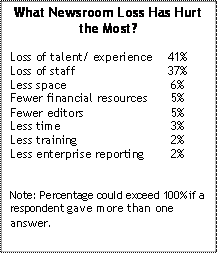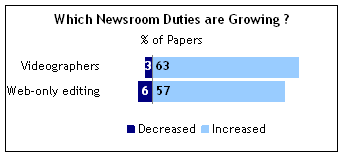As newsroom staffs decline in numbers and the content they produce changes, the skills—indeed, the very culture—of the newspaper newsroom is undergoing its own transformation. Although less visible, the implications of this change are every bit as important as other shifts now underway. In the churn of cutbacks and the arrival of new hires, some skills are in decline as veterans depart, while, at the same time, fresh, young blood brings in new skill sets and aptitudes.
What is disappearing?

At the top of the list, the ranks of editors who check stories prior to publication are thinning. Four out of ten newspapers (42%) reported that they have reduced the number of copy editors in the last three years, while just 12% have increased. And the pressure is even worse at larger papers. There, fully 67% say they have cut back on copy editors, versus just 2% that report increases.
Similarly, about twice the number of papers reported decreasing their ranks of general editors than said they had increased (30% v. 16%). The same was true for specialized editors (27% vs. 12%), and graphic artists, (23% report cutting back vs. 14% increasing).
Another diminishing skill set, interestingly, is photographers. Overall, 31% of newspapers say they have cut back on photographers in the last three years, vs. 12% that had made net increases. At the biggest papers, this trend is more pronounced, with the majority reporting cutbacks on photographers (52%) and just 6% saying they had made net additions.
Loss of Experience, Loss of Talent
Yet, the loss lamented most by newsroom executives is one far harder to quantify—the draining away of institutional memory—as older, and often more expensive, journalists are encouraged to leave through structured buyouts.
In interviews, editors said those leaving generally are among the most experienced and the most talented. As many of these veteran reporters go, they take with them the knowledge of their beat and their community, a deep loyalty to core journalistic values, and expertise so important to understanding stories. When an experienced editor leaves, the editing process weakens—and with it, a degree of the paper’s collective wisdom and judgment.

In survey responses, the loss of talent and experience was ranked as the number one concern when editors were asked to volunteer what has hurt their newsrooms the most. Fully 41% of editors surveyed offered comments that fell into this category. That was closely followed by the more general loss of staff overall (37%). Next, as a distant third, came less space (6%).
“When you have to let go someone who has been in a job for 5, 10 or 20 years, you lose something that cannot be recouped by the people who are left behind in the newsroom,” commented one editor, who counted the passing of institutional knowledge as the newsroom’s biggest loss.
Occasionally, the sheer pace of change sweeping through the industry has taken a toll in confidence levels and such fundamentals as the clarity about the role of the journalist.
When asked to cite the newsroom loss that hurt the most, one editor answered simply, “The concept of who and what we are.”
Added another, there is a “loss of stability—none in this business can predict with confidence where change is taking us.”
The bottom line culturally is this: In today’s newspapers, stories tend to be gathered faster and under greater pressure by a smaller, less experienced staff of reporters, then are passed more quickly through fewer, less experienced, editing hands on their way to publication. Some editors—but far from a majority of those interviewed—said they could see the costs.
“I read the stories (in my own paper) today and I see more holes, questions I want answered that are not,” lamented the editor of a large metropolitan newspaper. “I see more stories…that aren’t as well sourced as I’d prefer.”
What Skills Are Being Gained
The loss of institutional memory, and the erosion of the ranks of skilled editors and photographers, is part of a generational shift toward a more modern newsroom with more versatile, more tech-savvy reporters armed with new skills, higher production rates and an ability to multi-task.

By far the sharpest newsroom increases recorded in our survey were for the two web-related jobs measured: videographers and web-only editors. Fully 63% of editors surveyed had increased the amount of “editorial power” in videography. Another 57% said they had increased the resources devoted to “web-only editing.” And in hiring new staff, 90% of editors surveyed said they considered multi-media skills “very” or “somewhat essential” for the job.
Today, reporters who once carried with them little more than a pencil, a notebook and their newspaper’s first edition deadline time, are taking on new responsibilities at a dizzying pace. Anders Gyllenhaal, Executive Editor of the Miami Herald (circulation: 240,000) listed six distinct venues for which Herald newsroom staffers were expected to provide content: the print newspaper, the paper’s website (miamiherald.com), an entertainment/leisure time site launched recently by the paper (miami.com), the local PBS station for which the Herald provides news content, a web-linked television operation owned by the paper and the Herald’s instant news service, packages of brief news stories sent to Internet subscribers during the course of the day.
These tasks, together with new blood and the competitive juices stoked by a faster pace and constant deadline pressure, appear to have re-focused newsrooms. Asked to cite the newsroom change that most contributed to their ability to be competitive, editors used words like “urgency,” “excitement,” and “new enthusiasm” in describing a newly energized staff.
“New young reporters and editors who bring new skills and outlooks to those who have been here a long time,” responded one editor.
“(The) change in mindset and culture on the part of reporters and editors,” added another. “Our staff has a keen understanding of the need to out-report and out-hustle our competitors.”
Almost without exception, these gains are tied to the place where America’s newspapers, amid wrenching cutbacks, are trying to build anew: the Worldwide Web.




